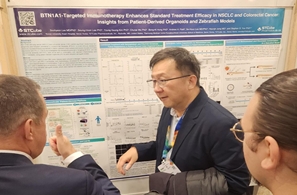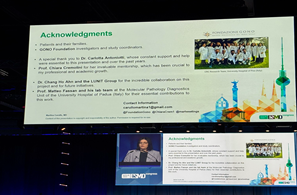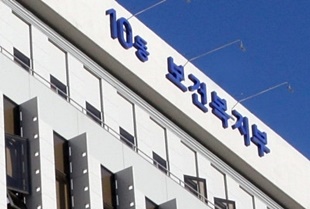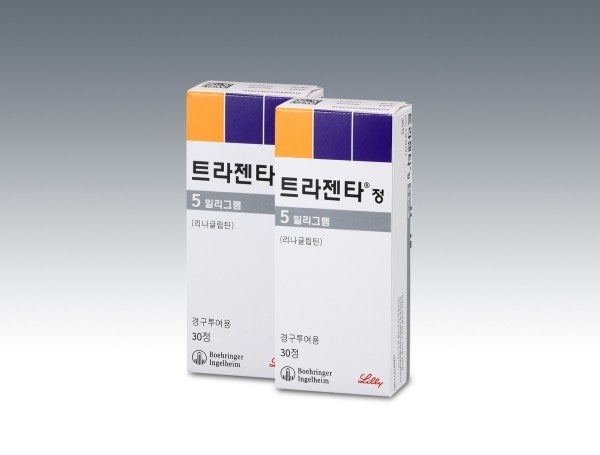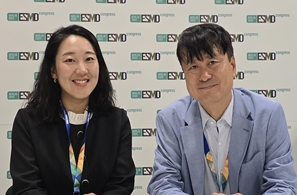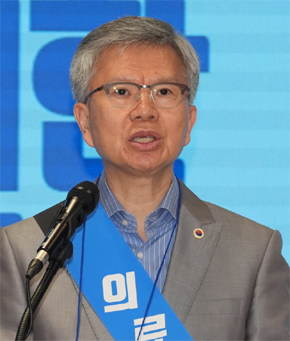Top Head
-
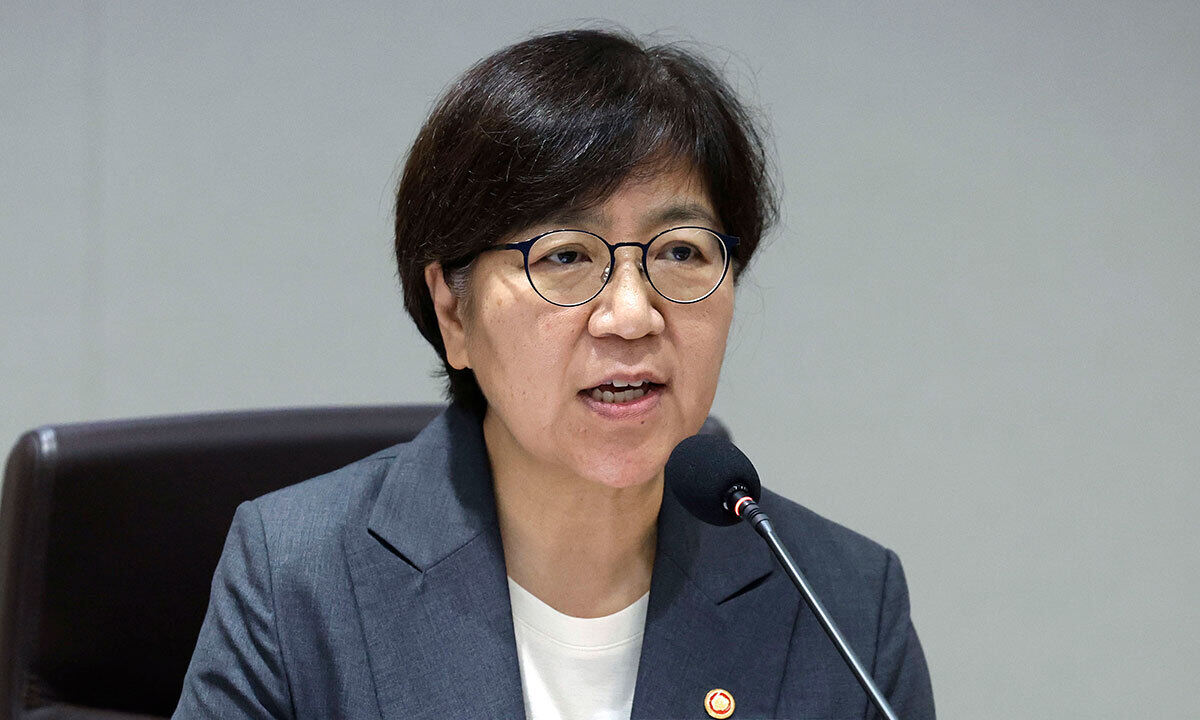
- by Lee, Jeong-Hwan Oct 23, 2025 06:12am
Minister of Health and Welfare Jeong Eun Kyeong is drawing attention after stating, "It is necessary to reform the pharmaceutical company compensation system through a drug pricing system linked to R&D investment. The Ministry will prepare measures to improve the drug pricing system." Minister Jeong also promised, "The Ministry will prepare multi-faceted support measures, including finance, tax, and human resources, for domestic pharmaceutical companies, including those designated as Innovative Pharmaceutical Companies." Regarding plans to reduce drug prices through the Re-evaluation of Foreign Drug Prices and the Reimbursement Appropriateness Re-evaluation, Minister Jeong acknowledged the following: the high level of domestic generic drug prices compared to major overseas countries, and the need for appropriate drug price management within limited National Health Insurance finances to ensure optimal drug coverage. She responded, "The Ministry will review drug price management after consulting with citizen groups, patient organizations, the pharmaceutical industry, and academic societies to ensure fair management and acceptance." Minister Jeong made these statements on October 22 in response to written inquiries during the parliamentary inspection from Democratic Party Representatives Nam In-soon and Lee Kai Ho, and People Power Party Representative Suh Myeong-ok. Rep. Nam and Rep. Suh pointed out the necessity of drug price incentives to encourage domestic pharmaceutical companies' New Drug R&D investment. The Ministry of Health and Welfare stated that the pharmaceutical and bio-industry is a national strategic industry and that national-level investment expansion is needed for it to become the next growth engine. In particular, the Ministry agreed on the need to reform the drug pricing system and compensation structure to strengthen the reward for the innovative value of new drugs and incentivize R&D investment, aiming to foster pharmaceutical companies with global new drug development capabilities. Minister Jeong stated, "We will prepare drug pricing system improvement measures after gathering opinions from industry experts and academic societies." She added, "We will comprehensively review the sound growth of the pharmaceutical and bio-industry and the sustainability of National Health Insurance finances by closely examining the status of domestic and foreign drug pricing systems, policy improvement areas, and global trade situations, while considering social acceptance." Regarding plans to foster domestic pharmaceutical and biotech companies, Minister Jeong explained, "The government has established three core tasks to achieve the vision of making Korea a global top 5 nation in the K-BIO and Pharmaceutical sector," and added, "We will shift to consumer-oriented regulations, accelerate innovative growth by linking technology, human resources, and capital, and support the co-growth of anchor and biotech companies to strengthen global competitiveness." Minister Jeong further stated, "We plan to establish detailed implementation plans for each task through consultation with relevant ministries and will execute follow-up measures without fail, reviewing opinions gathered from forums," and added, "We will improve the Innovative Pharmaceutical Company Designation System to reflect changes in the industry ecosystem. We will support the strengthening of domestic companies' competitiveness through field-centered workforce training and support programs for attracting overseas talent." Regarding the push for the Re-evaluation of Foreign Drug Prices and the Reimbursement Appropriateness Re-evaluation, Minister Jeong gave a principled answer, stating that the Ministry will consider industry opinions during the review process. Minister Jeong said, "Drug expenditure in Korea continues to increase due to the growing number of elderly and chronic disease patients." She added, "Domestic generic drug prices are high compared to major overseas countries. We will reasonably manage drug prices after listing by gathering feedback from the field, including the pharmaceutical industry." She concluded, "The Ministry is currently conducting the reimbursement appropriateness evaluation for eight APIs this year," and added, "We are preparing a fairer and systematic implementation plan based on the results of the five-year re-evaluation effort. We will review it after sufficient consultation to ensure social acceptance."
Headline
- Company
- BTN1A1 effective in PD-L1–negative, resistant tumors
- by Hwang, byoung woo Oct 23, 2025 06:12am
- STCube is venturing into one of immuno-oncology’s uncharted territories. The company has been exploring therapeutic responses of its first-in-class BTN1A1-targeting drug candidate, Nelmastobart, in patients with PD-L1&8211;negative or PD-1-resistant tumors, marking the first step toward realizing precision immunotherapy. At the European Society for Medical Oncology (ESMO) 2025 Congress, STCube presented two studies: an investigator-initiated trial and a preclinical study. The investigator-initiated trial demonstrated a correlation between BTN1A1 expression levels and progression-free survival, while the preclinical study showed the complementary effect of BTN1A1 inhibition when combined with chemotherapy. Dailypharm met with Seung-han Yoo, Chief Scientific Officer (CSO) of STCube, and Soo-hyeon Lee, Professor of Medical Oncology at Korea University Anam Hospital, in Berlin to discuss the significance of the research and future plans. “Efficacy observed in PD-L1&8211;negative patients, new potential found for precision immunotherapy” According to the company, BTN1A1 is a target first identified globally by STCube and is an immune checkpoint protein that acts independently of PD-L1. BTN1A1 shows minimal expression in normal tissues but high expression in tumor cells, making it both a therapeutic target and a potential predictive biomarker. CSO Yoo explained, “BTN1A1 is highly expressed in tumors where PD-L1 is rarely expressed, particularly colorectal cancer and non-small cell lung cancers. It has the potential to open a new response pathway in patient groups unresponsive to existing immune checkpoint inhibitors.” The ESMO presentation featured interim analysis results from an ongoing Phase 1b/2 investigator-initiated clinical trial for metastatic colorectal cancer at Korea University Anam Hospital, focusing on differences in progression-free survival by degree of BTN1A1 expression. The preclinical poster confirmed that BTN1A1 expression actually increases after chemotherapy. CSO Yoo stated, “Unlike how PD-L1 is primarily expressed in rapidly growing tumor cells, BTN1A1 is highly expressed in slow-growing cells that remain after treatment&8212;specifically, dormant tumor cells. This allows for a complementary effect when combined with chemotherapy.” He added, “In the study, tumor suppression was significantly enhanced when BTN1A1 inhibitors were co-administered with standard anticancer drugs like FOLFOX (folinic acid + fluorouracil + oxaliplatin) and FOLFIRI (folinic acid + fluorouracil + irinotecan) for colorectal cancer, FOLFIRI for lung cancer, and docetaxel for lung cancer. The findings suggest we could consider adopting a combination strategy for patients resistant to PD-1 inhibitors.” “Extends revival in BTN1A1-High patients... will acclerate biomarker clinical trials” A correlation between BTN1A1 expression levels and clinical response was also observed in the ongoing colorectal cancer investigator-initiated clinical trial (Phase 1b/2) at Korea University Anam Hospital. CSO Yoo, analyzed, “The higher the BTN1A1 expression, the more pronounced the response. The median progression-free survival (mPFS) was 6.3 months in the patient group with a BTN1A1 H-Score of 250 or higher, 4.2 months in the 150-249 group, and 4.0 months in the group below 150.” These results represent an improvement over the average 2-3 months seen with existing standard third-line therapies. Based on this, the company is actively advancing its biomarker-based clinical strategy targeting BTN1A1-positive patients and is preparing to initiate dosing in its company-led Phase II trial for non-small cell lung cancer by the end of this year. On this day, Professor Lee summarized the clinical significance of the BTN1A1 inhibitor into four points, in addition to the explanation provided by CSO Yoo. “It presents new possibilities for cancer types unresponsive to existing PD-1-centric therapies and can serve as a combination partner for PD-1-resistant or refractory patients. Alongside the significance of biomarker-based clinical design, its minimal toxicity when combined positions it to evolve into a safe immuno-oncology platform.” Professor Lee further evaluated, “While PD-1 combination therapy can sometimes cause unexpected immune-related adverse reactions, BTN1A1 inhibitors do not add toxicity when combined with existing drugs. In fact, their high safety profile makes them suitable as new combination partners.” Lee added that no immune-related adverse reactions were reported in actual patient administration, but noted that confirming long-term and large-scale safety remains a subsequent task. “Will build data and explore global collaboration… to realize precision immunotherapy” The company plans to use these results as clinical evidence for its BTN1A1-based precision immunotherapy platform and accelerate the expansion of its subsequent pipeline. Specifically, it intends to secure additional clinical data for colorectal and lung cancer by early next year and then formally initiate technology transfer discussions with global pharmaceutical companies. In the long term, the strategy is to build a precision immunotherapy portfolio centered on BTN1A1 inhibitors to address unmet needs in the post-PD-1 market. CSO Yoo added, “BTN1A1 could be the missing link explaining immune responses not accounted for by PD-L1. We will work step-by-step to demonstrate the potential of precision immuno-oncology through clinical data.”
- Company
- "AI pathology analysis changes trt paradigm…Lunit presents"
- by Hwang, byoung woo Oct 23, 2025 06:11am
- At the European Society for Medical Oncology conference (ESMO Congress 2025), Lunit presented new clinical evidence for its Artificial Intelligence (AI) pathology analysis. The results are particularly significant as Lunit demonstrated that AI can distinguish treatment response in a subset of proficient mismatch repair (pMMR) colorectal cancer (CRC) patients, a group that typically shows little response to immunotherapy. DailyPharm met with Im Yu-ju, Medical Director of Lunit's Oncology Group (Hematology-Oncology Specialist), at ESMO 2025 to discuss the clinical significance and future vision of the research. "Predicting treatment response from a single Slide... AI biomarker proves utility" Lunit presented two abstracts utilizing its AI biomarker platform, Lunit SCOPE. In particular, Oral Presentation detailing the results of a joint study with Professor Chiara Cremolini's research team at the University of Pisa garnered attention. The study's core objective was to predict the therapeutic effect of atezolizumab (Tecentriq) combination therapy using Lunit's AI pathology platform, 'Lunit SCOPE.' Im explained, "pMMR colorectal cancer is a notoriously intractable cancer that barely responds to immunotherapy. However, this study allowed us to identify a specific patient subgroup that benefits from the addition of immunotherapy." Im emphasized, "We quantified the tumor microenvironment (TME) using only conventional H&E (Hematoxylin & Eosin-stained slide) slides, without the need for new tests or tissue collection, to predict treatment response. This result shows that AI can possess clinical utility as a biomarker." H&E slides are standard stained tissue slides made from most patient specimens during pathological diagnosis. The clinical applicability is high because they can be used without additional testing. In the study, researchers analyzed pathology slides from 161 patients using Lunit SCOPE to quantify the density of six cell types, including lymphocytes and tumor cells. Subsequently, they stratified patients into two groups (A/B). The analysis showed that in the atezolizumab combination group, Group A demonstrated improvement in both progression-free survival (PFS) and overall survival (OS) compared to Group B. Notably, this difference was observed only in the combination arm, but not in the chemotherapy monotherapy group, proving Lunit SCOPE to be an immunotherapy-specific predictive indicator. "AI incorporated complex immune response...AI refines tumor microenvironment analysis" The key finding of this research is its complex interpretation of the tumor microenvironment (TME), moving beyond simple cell density analysis. Im stated, "The response to immunotherapy is a comprehensive result of complex immune factors, including T-cell infiltration, antigen presentation pathways, and neoantigens, not just PD-L1 expression." She added, "Lunit SCOPE quantifies these multi-layered variables through AI pathology analysis and presents them in an interpretable format." In particular, this model moved beyond the traditional inflamed-centric classification by incorporating the interplay between various cells, including endothelial cells and fibroblasts. Im added, "Along with lymphocyte distribution, the proportion of dividing tumor cells was the highest contributor to predicting response," and said, "AI has overcome the limitations of conventional single-factor-based biomarkers." Furthermore, Im said, "Although it varies by slide size, the analysis of a single slide typically takes 5&8211;10 minutes. Even large-volume data can be processed within tens of minutes." She stated, "This speed allows the results to be immediately referenced concurrently with the clinical interpretation process." Lunit, which has attended ESMO for five consecutive years since 2021, is leveraging this research to expand collaboration discussions with global pharmaceutical companies. Im said, "Since many immune checkpoint inhibitors are already approved, collaboration is more active in companion diagnostics for subsequent indications and new drug development, rather than new clinical trials," and added, "We are accumulating evidence through investigator-initiated clinical trial data," "We are concurrently researching biomarkers for next-generation anti-cancer drugs like BiTE (Bispecific T-cell Engager) and ADC based on Lunit SCOPE IO," said Im and mentioned, "Our goal is to establish the technology as a practical treatment predictive tool through collaboration with partner pharmaceutical companies from the clinical trial stage." "AI, a New Partner in Drug Development... Expanding to ADC and TKI" At the annual ESMO conference, presentations on new modalities, such as ADCs, are consistently featured alongside those on immunotherapies. Lunit is also expanding its AI biomarker research in these areas. Im stated, "In the ADC field, global pharmaceutical companies are actively adopting digital pathology AI-based Companion Diagnostics (CDx), where Lunit's analysis technology can significantly contribute." Lunit is currently developing biomarkers for ADC drugs using IHC analysis of immunostained slides and is also building a TKI response-prediction model using morphological pattern analysis. Im also added, "If AI quantifies drug-specific response patterns, it will allow us to connect both companion diagnostics and patient-specific treatment in the future." At this ESMO Congress 2025, Lunit also presented research on renal cell carcinoma and non-small cell lung cancer in addition to colorectal cancer. In the renal cell carcinoma study, the immune-activated patient group showed a significantly higher ORR of 60.5% in the nivolumab + ipilimumab combination therapy compared to the non-activated group (23.2%). In the NSCLC study, the immune-activated phenotype showed a superior response in a Japanese multi-center patient cohort, confirming the reproducibility of the AI model. Im said, "AI pathology analysis is not limited to a specific cancer type." She added, "We are conducting multi-cancer expansion studies to apply it to early treatment stages and adjuvant therapies." Ultimately, the assessment is that AI is no longer a future technology but becoming established as a practical tool that is changing treatment strategies in real-world clinical settings. Im concluded, "AI pathology analysis is not limited to a specific cancer type. Lunit is conducting multi-cancer expansion studies so that it can be applied to early treatment stages and adjuvant therapies."
- Policy
- ‘Expanding dual pricing under review to mitigate risks’
- by Jung, Heung-Jun Oct 23, 2025 06:11am
- The Ministry of Health and Welfare has expressed its commitment to actively review plans to expand the dual drug pricing system to resolve risks associated with the introduction of innovative new drugs. The MOHW expressed consensus on the need for the expansion as a countermeasure to the Most-Favored-Nation (MFN) drug pricing system introduced by the Trump administration in the United States. Responding to a written inquiry from lawmakers Ye-ji Kim and Jia Han of the People Power Party during the National Assembly audit on the 21st, the MOHW stated that it is reviewing measures for improvement. The lawmakers asked what concrete measures the government plans to take to mitigate risks posed by other countries, referencing Korea’s drug prices. The Ministry stated, “As the domestic launch of new drugs could be postponed or delayed if Korea becomes a reference country, we agree on the need to expand the dual pricing system to enhance patient access to treatments. We will prepare countermeasures.” It explained that it is reviewing plans to expand the current dual drug pricing system by gathering industry opinions. The Ministry expressed its commitment to the task, stating, “We will actively review plans to expand the dual drug pricing system to resolve the risk related to introducing innovative new drugs domestically.” Regarding the proposal to expand the risk-sharing system beyond anticancer drugs to cover new drugs for chronic diseases and other conditions, it responded that it would review reasonable systemic improvements. “In August last year, we revised the system to allow new drugs for severe, irreversible chronic diseases that significantly impair quality of life to also apply for RSA. We will continue to review rational policy improvements through expert consultation and on-site feedback.”
- Policy
- MOHW to institutionalize a fast-track listing system
- by Jung, Heung-Jun Oct 23, 2025 06:10am
- The Ministry of Health and Welfare (MOHW) has announced plans to institutionalize a fast-track reimbursement system based on the outcomes of the ongoing “approval&8211;evaluation&8211;negotiation” pilot program, aimed at accelerating patient access to innovative new drugs. It also stated its intention to expedite the reimbursement decision process for drugs for severe diseases that have submitted applications. The ministry responded so to Rep Mi-hwa Seo’s inquiry on strengthening access to new drugs during the National Assembly audit on the 21st. “We are currently conducting a pilot program that concurrently operates the regulatory approval (MFDS), reimbursement evaluation (HIRA), and price negotiation (NHIS) processes to support faster access. We will analyze the program’s performance and collect feedback from the field to review options for institutionalizing the system.” Furthermore, to provide optimal drug coverage within limited finances, the MOHW plans to include rational improvements to cost-effectiveness evaluations and implement a periodic drug price adjustment system, and strengthen compensation for R&D investments. The Ministry of Health and Welfare stated, “We aim to enhance coverage for severe and rare diseases by making cost-effectiveness evaluations more rational. We also plan to establish a periodic drug price adjustment system to proactively prepare for future increases in drug costs and strengthen appropriate compensation for R&D investment to foster an innovation ecosystem that promotes new drug development." The ministry expressed plans to expedite reimbursement decisions for specific drugs for severe diseases, such as third-line treatments for metastatic colorectal cancer. The MOHW responded, “‘Fruzaqla Cap (Takeda Pharmaceuticals Korea)’ is being reviewed for reimbursement as a third-line treatment for metastatic colorectal cancer. We will expedite its review procedures and make a prompt decision.” The ministry acknowledged the need for improvement regarding third-generation thrombolytic agents that are reimbursed overseas but not yet introduced in Korea. The Ministry stated, “We agree on the necessity of introducing third-generation thrombolytic agents, which reduce the burden of existing thrombolytic therapy. Currently, the second-generation agent Actilyse is listed, and the third-generation agent Metalyse was approved in October, but we confirm that no reimbursement application has been submitted. Once submitted, we will ensure the review proceeds smoothly.”
- Company
- Boehringer withdraws 1 lawsuit over unlisted Trajenta patent
- by Kim, Jin-Gu Oct 22, 2025 06:11am
- Boehringer Ingelheim has voluntarily withdrawn one of its ongoing patent disputes involving unlisted Trajenta (linagliptin) patents. Attention is focused on whether this withdrawal will lead to the conclusion of other ongoing disputes, as Boehringer Ingelheim has been pursuing unlisted patent challenges even after the launch of Trajenta generics. According to the pharmaceutical industry, on October 21 Boehringer Ingelheim voluntarily withdrew a lawsuit seeking to cancel a patent invalidation ruling against 16 companies, including Genuone Sciences, on October 20. The patent was registered under the name "Treatment of Diabetes in Patients with Insufficient Glycemic Control Despite Therapy with Oral or Non-oral Agents for Diabetes." It involves the combination of linagliptin and sulfonylurea (SU). This patent was one of the unlisted Trajenta-related patents. Boehringer Ingelheim filed this patent in January 2020, and it was registered with the Korean Intellectual Property Office in April 2022. However, it was not listed in the Ministry of Food and Drug Safety (MFDS) patent registry. Generic companies, anticipating the launch of Trajenta generics in June 2023, challenged this unlisted patent to alleviate patent risk. Companies that filed the invalidation trial included Genuone Sciences, Kukje Pharm, Kyungbo Pharmaceutical, KyungDong Pharm, DongKoo Bio & Pharma, Dongwha Pharm, Daewon Pharm, Boryung, Shinil Pharm, Aju Holdings, Alvogen Korea, Ildong Pharmaceutical, Jeil Pharmaceutical, Korea Prime Pharm, Korea Huons, and Hanlim Pharm. The substance patent for Trajenta expired while the dispute was ongoing. Twenty-nine companies launched their generics when substance patent expired in May of last year. However, Trajenta's unlisted patents continue to pose a risk to generic companies. If generic companies lose unlisted patent disputes, their generic sales could be deemed patent infringement. In such a scenario, Boehringer Ingelheim could file for preliminary injunctions to halt sales and pursue damages through lawsuits. In May of this year, the Intellectual Property Trial and Appeal Board ruled in favor of the generic companies. Boehringer Ingelheim subsequently appealed to the Patent Court. However, it voluntarily withdrew the lawsuit approximately five months later. This concluded one of the multiple lawsuits surrounding Trajenta's unlisted patents. The pharmaceutical industry's attention is now focused on whether the remaining disputes over Trajenta's unlisted patents will also be resolved. Boehringer Ingelheim has registered over 10 unlisted Trajenta patents, in addition to the linagliptin-sulfonylurea combination patent. Generic companies have filed circumvention and invalidation trials against each of these patents, and the disputes are ongoing. If Boehringer Ingelheim voluntarily withdraws the remaining unlisted patent lawsuits, the patent risks surrounding Trajenta generics are mostly expected to be resolved.
more articles
- [Op-Ed] Patients, no time left for 'new drug comb therapies'
- Special Contribution | Eo, Yun-Ho
MOST READ


